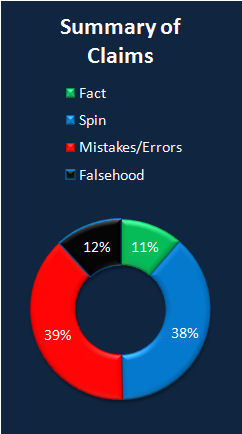
FAIR is a non-profit organization dedicated to providing well-documented answers to criticisms of the doctrine, practice, and history of The Church of Jesus Christ of Latter-day Saints.
A FAIR Analysis of: 'One Nation Under Gods' A work by author: Richard Abanes
|
Becoming Gods |
Summary: In early 2002 a new book entitled One Nation under Gods (ONUG) appeared on bookshelves, promising to tell the "real" history of the Mormon Church. The author attempts to pull disparate sources together to paint a picture that, when compared to objective reality, more closely resembles a Picasso than a Rembrandt—skewed and distorted—obscuring and maligning the actual doctrines and beliefs as understood and practiced by members of The Church of Jesus Christ of Latter-day Saints for more than 150 years.
—The author, posted on his website "ERRATA FOR ONE NATION UNDER GODS" (Dec. 2008 - web page has since been removed. This link goes to the web archive for the page)
Summary: FairMormon's original review of One Nation Under Gods was of the original 2002 hardback edition. The author has responded that there were editorial problems with this edition. We acknowledge that corrections were made in the paperback edition released in 2003 in response to some of the original reviews. Consequently, all previous FairMormon reviews have been edited for accuracy and tone, and the paperback edition of this work has been evaluated on its own merits. (It should be noted that the corrected paperback edition bears no markings indicating that it is a second edition or an updated edition; it simply appears as a paperback edition of the original.) This is an index of claims made in this work with links to corresponding responses. An effort has been made to provide the author's original sources where possible. In the subarticles linked below the hardback edition is represented by "HB" and the paperback edition by "PB."
| Claim Evaluation |
| One Nation Under Gods |

|

|
[M]ore than a few Mormons, although they had never actually read my book, declared without hesitation that it was rife with errors.
—One Nation Under Gods, p. 438 (paperback edition)
We did indeed read the book (both the Hardback and the Paperback), thoroughly. They are, and continue to be, rife with errors.
[T]o be honest, your FAIR analysis of the hardbound is actually hurting you in some very interesting ways -- and you don't even know it. Suffice it to say, I have been enjoying the many times I've had the pleasure of point out to lots of Mormons (many of them now former Mormons) where FAIR has not been completely honest, and where FAIR has shown itself to be terrifically nit-picky and petty. I thank you.
—The author, commenting on FAIR's previous analysis of this work. Posted to Mormon Apologetics and Discussion Board, Nov. 21, 2008
...what ONUG [One Nation Under Gods] did was to provide needed information to non-Mormons, evangelicals, secularists, and from what I hear, even many Mormons (many of whom, thanks to ONUG, are no longer Mormons).
—The author, commenting on the value of his book. Posted to Mormon Apologetics and Discussion Board, Dec. 7, 2008
Props to FAIR for reacting so quickly to my responses to what they had kept up at their website for 5 years. After my refutation of their so-called critique of One Nation Under Gods was posted, it took them about 1-2 weeks to take everything down. Good job, FAIR!
—The author, responding to this "so-called" critique. The statement, however, is not accurate. The original 27 articles were taken off the FAIR website and moved here to the FAIR Wiki, where over 100 new articles were added. Posted to Mormon Apologetics and Discussion Board, May 14, 2009
It should be noted that the author's response to the list of problems documented by FAIR is that the editing on the hardback edition of One Nation Under Gods (ONUG) was incomplete and that many of the problems were corrected in the paperback edition, published a year later. (This corrected paperback edition bears no markings indicating that it is a second edition or an updated edition; it simply appears as a paperback edition of the original.) This review primarily treats the paperback edition of this work, with an acknowledgment of corrections made by the author to the hardback edition.
In early 2002 a new book entitled One Nation under Gods (ONUG) appeared on bookshelves, promising to tell the "real" history of the Mormon Church. In the words of its author,
It is beyond legitimate dispute that the Mormon church has for decades been painting for the general public a decidedly biased picture of the Latter-day Saint faith, especially with regard to the origins of the Book of Mormon. Fortunately, a more objective sketch of Mormonism's earliest years can be drawn using non-LDS witnesses, secular media articles, and private journals (Mormon and non-Mormon).
All of these sources will be used in this book to discover how Mormonism's founder—Joseph Smith—formed, controlled, and expanded his church, which today is one of the wealthiest and most influential religions in the world. [ONUG, xvi]
With his thesis stated and his purpose laid bare, the author attempts to pull disparate sources together to paint a picture that, when compared to objective reality, more closely resembles a Picasso than a Rembrandt—skewed and distorted—obscuring and maligning the actual doctrines and beliefs as understood and practiced by members of The Church of Jesus Christ of Latter-day Saints for more than 150 years.

FAIR is a non-profit organization dedicated to providing well-documented answers to criticisms of the doctrine, practice, and history of The Church of Jesus Christ of Latter-day Saints.
We are a volunteer organization. We invite you to give back.
Donate Now